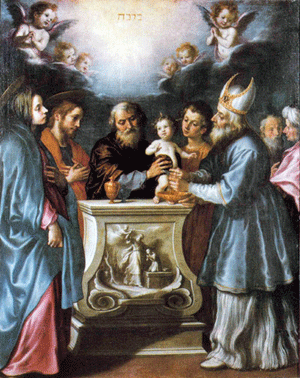

Our new-born King and Savior is eight days old today; the Star that guides the Magi is advancing towards Bethlehem, and five days hence will be standing over the Stable where our Jesus is being nursed by His Mother. Today the Son of Man is to be circumcised; this first sacrifice of His innocent Flesh must honor the eighth day of His mortal life. Today also a Name is to be given Him; the Name will be Jesus, and it means Savior. Mysteries abound on this day; let us not pass one of them over, but honor them with all possible devotion and love.
But this day is not exclusively devoted to the Circumcision of Jesus. The mystery of this Circumcision forms part of that other great mystery, the Incarnation and Infancy of our Savior—a mystery on which the Church fixes Her heart not only during this Octave, but during the whole forty days of Christmastide. Then, as regards Our Lord's receiving the Name of Jesus, a special Feast, which we shall soon be keeping, is set apart in honor of it. There is another object that shares the love and devotion of the Faithful on this great Solemnity. This object is Mary, the Mother of God. The Church celebrates today the august prerogative of this Divine Maternity which was conferred on a mere creature, and made Her the co-operatrix with Jesus in the great work of man's salvation.
The holy Church of Rome used formerly to offer two Masses on the first of January; one was for the Octave of Christmas Day, the other was in honor of Mary. She now unites the two intentions in one Sacrifice, in the same manner as, in the rest of the Day's Office, She unites together the acts of Her adoration of the Son, and the expressions of Her admiration for and confidence in the Mother.
The Greek Church does not wait for this eighth day, in order to pay its tribute of homage to Her who has given us our Emmanuel. She consecrates to Mary the first day after Christmas, that is, December 26, and calls it the Synaxis (Liturgy) of the Mother of God, making the two days one continued Feast. She is thus obliged to defer the Feast of St. Stephen to December 27.
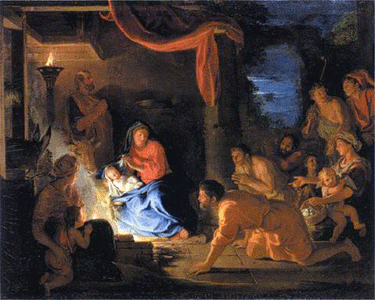 But it is today that we, the children of the Roman Church, must pour forth all the love of our hearts for the Virgin-Mother,
and rejoice with Her in the exceeding happiness She feels at having given birth to Her and our Lord. During Advent we contemplated
Her as pregnant with the world's salvation; we proclaimed the glory of that Ark of the New Covenant, whose chaste womb was the earthly
paradise chosen by the King of Ages for His dwelling-place. Now She has brought Him forth, the Infant-God; She adores Him, Him Who is Her Son.
She has the right to call Him Her Child; and He, God as He is, calls Her in strictest truth His Mother.
But it is today that we, the children of the Roman Church, must pour forth all the love of our hearts for the Virgin-Mother,
and rejoice with Her in the exceeding happiness She feels at having given birth to Her and our Lord. During Advent we contemplated
Her as pregnant with the world's salvation; we proclaimed the glory of that Ark of the New Covenant, whose chaste womb was the earthly
paradise chosen by the King of Ages for His dwelling-place. Now She has brought Him forth, the Infant-God; She adores Him, Him Who is Her Son.
She has the right to call Him Her Child; and He, God as He is, calls Her in strictest truth His Mother.
Let us not be surprised, therefore, at the enthusiasm and profound respect wherewith the Church extols the Blessed Virgin and Her prerogatives. Let us on the contrary be convinced that all the praise the Church can give Her, and all the devotion She can ever bear towards Her, are far below what is due to Her as Mother of the Incarnate God. No mortal will ever be able to describe, or even comprehend, how great a glory accrues to Her from this sublime dignity. For, as the glory of Mary comes from Her being the Mother of God, one would have first to comprehend God Himself in order to measure the greatness of Her dignity. It is to God that Mary gave our human nature; it is God Whom She had as Her Child; it is God Who gloried in rendering Himself, inasmuch as He is Man, subject to Her: hence, the true value of such a dignity, possessed by a mere creature, can only be appreciated in proportion to our knowledge of the sovereign perfections of the great God, Who thus deigns to make Himself dependent upon that favored creature. Let us therefore bow down in deepest adoration before the Majesty of our God; let us therefore acknowledge that we cannot respect as it deserves the extraordinary dignity of Her whom He chose for His Mother.
The same sublime mystery overpowers the mind from another point of view: what were the feelings of such a Mother towards such a Son? The Child She holds in Her arms and presses to Her heart is the Fruit of Her virginal womb, and She loves Him as Her own; She loves Him because She is His Mother, and a mother loves her child as herself—nay, more than herself. But when She thinks upon the infinite majesty of Him Who has thus given Himself to Her to be the object of Her love and Her fond caresses, She trembles in Her humility, and Her soul has to turn, in order to bear up against the overwhelming truth, to the other thought of the nine months She held this Babe in Her womb, and of the filial smile He gave Her when Her eyes first met His. These two deep-rooted feelings—of a creature that adores, and of a Mother that loves—are in Mary's heart. To be Mother of God implies all this: and may we not well say that no pure creature could be exalted more than She? And that in order to comprehend Her dignity, we should first have to comprehend God Himself? And that only God's infinite wisdom could plan such a work, and only His infinite power accomplish it?
A Mother of God! It is the mystery whose fulfillment the world, without knowing it, was awaiting for four thousand years. It is the work which, in God's eyes, was incomparably greater than that of the creation of a million new worlds, for such a creation would cost Him nothing: He has but to speak, and all whatsoever He wills is made. But that a creature should become Mother of God, He has had not only to suspend the laws of nature by making a Virgin Mother, but also to put Himself in a state of dependence upon the happy creature He chose for His Mother. He had to give Her rights over Himself, and contract the obligation of certain duties towards Her. He had to make Her His Mother and Himself Her Son.
It follows from all this, that the blessings of the Incarnation, for which we are indebted to the love wherewith the Divine Word loved us, may and ought to be referred, though in an inferior degree, to Mary Herself. She is the Mother of God, because She consented to it, for God vouchsafed not only to ask Her consent, but moreover to make the coming of His Son into this world depend upon Her giving it. As this His Son, the Eternal Word, spoke His FIAT over chaos, and the answer to His word was creation; so did Mary use the same word FIAT: let it be done unto Me (Luke 1: 38). God heard Her word, and immediately the Son of God descended into Her virginal womb. After God, then, it is to Mary, His ever Blessed Mother, that we are indebted for our Emmanuel.
The divine plan for the world's salvation included the existence of a Mother of God: and as heresy sought to deny the mystery of the Incarnation, it equally sought to deny the glorious prerogative of Mary. Nestorius asserted that Jesus was only man; Mary consequently was not Mother of God, but merely Mother of a Man called Jesus. This impious doctrine roused the indignation of the Catholic world. The East and West united in proclaiming that Jesus was God and Man, in unity of Person; and that Mary, being His Mother, was, in strict truth, Mother of God. This victory over Nestorianism was won at the Council of Ephesus. It was hailed by the Christians of those times with an enthusiasm of faith which not only proved the tender love they had for the Mother of Jesus, but was sure to result in the setting up of some solemn trophy that would perpetuate the memory of the victory. It was then that the pious custom began, in both the Greek and Latin Churches, of uniting during Christmas the veneration due to the Mother with supreme worship given to the Son. The day assigned for the united commemoration varied in several countries, but the sentiment of religion which suggested the Feast was one and the same throughout the entire Church.
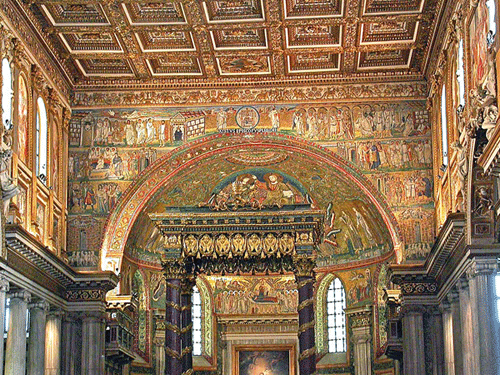 The holy Pope Xystus III ordered an immense mosaic to be worked into the chancel-arch of the Church of St. Mary Major in Rome,
as a monument to the Holy Mother of God. The mosaic still exists, bearing testimony as to what was the faith held in the 5th century.
It represents the various scriptural types of Our Lady, and the inscription of the holy Pontiff is still visible in its bold letters:
Xystus Episcopus Plebi Dei (Xystus the Bishop to the People of God): for the Saint had dedicated to the faithful this his offering to Mary,
the Mother of God (see the image at right and detail below).
The holy Pope Xystus III ordered an immense mosaic to be worked into the chancel-arch of the Church of St. Mary Major in Rome,
as a monument to the Holy Mother of God. The mosaic still exists, bearing testimony as to what was the faith held in the 5th century.
It represents the various scriptural types of Our Lady, and the inscription of the holy Pontiff is still visible in its bold letters:
Xystus Episcopus Plebi Dei (Xystus the Bishop to the People of God): for the Saint had dedicated to the faithful this his offering to Mary,
the Mother of God (see the image at right and detail below).
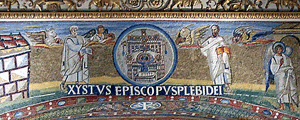 Special chants were also composed at Rome for the celebration of the great mystery of the Word made Man through Mary.
Sublime Responsories and Antiphons, accompanied by appropriate music, were written to serve the Church and Her children as
the expression of their Faith, and they are the ones we now use. The Greek Church makes use of some of these very antiphons
for the Christmas Solemnity; so that with regard to the mystery of the Incarnation there is not only unity of faith,
there is also oneness of devotional sentiment.
Special chants were also composed at Rome for the celebration of the great mystery of the Word made Man through Mary.
Sublime Responsories and Antiphons, accompanied by appropriate music, were written to serve the Church and Her children as
the expression of their Faith, and they are the ones we now use. The Greek Church makes use of some of these very antiphons
for the Christmas Solemnity; so that with regard to the mystery of the Incarnation there is not only unity of faith,
there is also oneness of devotional sentiment.
The First Vespers of the Circumcision are made peculiarly solemn by the chanting of the five venerable Antiphons to which we have just alluded. They are accompanied by the Psalms which are sung at the Vespers of the Feasts of Our Lady:
Ant. 1: O wonderful exchange! The Creator of the human race, taking upon Himself a body and a soul, has deigned to be born of a Virgin, and, appearing here below as man from no human generation, has made us partakers of His Divinity.
Ant. 2: When Thou wast born of a Virgin in a wonderful manner, the Scriptures were fulfilled: Thou hast come down like rain upon the fleece in order to save the human race. O our God, we praise Thee!
Ant. 3: In the bush which Moses saw, burning yet not consumed, we have a figure of the preservation of Thy glorious virginity. O Mother of God, intercede for us!
Ant. 4: The root of Jesse has budded forth; a Star is risen out of Jacob; the Virgin hath brought forth the Savior. O our God, we praise Thee!
Ant. 5: Behold, Mary hath borne for us a Savior: John beheld Him and cried, saying: Behold the Lamb of God, behold Him that taketh away the sins of the world. Alleluia.
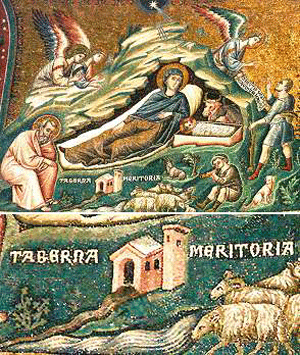
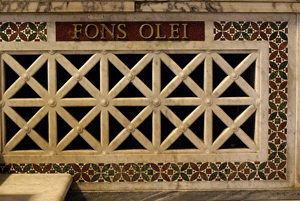 The station of the Mass is at St. Mary's across the Tiber. It was but just that this Basilica should receive such an honor,
for it is the most ancient of all Churches raised by the devotion of the faithful of Rome in honor of Our Blessed Lady.
It was consecrated in the 3rd century by St. Callistus I on the site of the ancient Taberna Meritoria, celebrated even among
the pagans for the fountain of oil which sprang up in that spot in the reign of Augustus, and flowed into the Tiber.
The piety of the Christians interpreted this as a symbol of the Christ that was afterward born: and the Basilica is
sometimes called Fons Olei (Fountain of Oil).
The station of the Mass is at St. Mary's across the Tiber. It was but just that this Basilica should receive such an honor,
for it is the most ancient of all Churches raised by the devotion of the faithful of Rome in honor of Our Blessed Lady.
It was consecrated in the 3rd century by St. Callistus I on the site of the ancient Taberna Meritoria, celebrated even among
the pagans for the fountain of oil which sprang up in that spot in the reign of Augustus, and flowed into the Tiber.
The piety of the Christians interpreted this as a symbol of the Christ that was afterward born: and the Basilica is
sometimes called Fons Olei (Fountain of Oil).
(Top Left) Mosaic of Nativity showing the Taberna Meritoria; (Bottom Left) Detail of the Taberna; (Right) Site of the Fountain of Oil.
The Introit is that of the Third Mass of Christmas Day (this being the Octave Day), as are also most of the portions that are chanted by the choir. In the Collect the Church celebrates the fruitful Virginity of the Mother of God, and shows Mary to us as the source whence God poured out upon mankind the blessing of the Incarnation. She expresses to God Himself the hopes we have in the intercession of this privileged creature:
O God, Who by the fruitful Virginity of Blessed Mary hast given to mankind the rewards of eternal salvation; grant, we beseech Thee, that we may experience Her intercession, by whom we have received the Author of Life, Our Lord Jesus Christ Thy Son. Who liveth and reigneth, etc.
The Epistle is the same as that of the Midnight Mass of Christmas:
Lesson of the Epistle of St. Paul the Apostle to Titus (Ch. 2).
Dearly beloved: The grace of God our Savior has appeared to all men, instructing us, in order that, rejecting ungodliness and worldly lusts, we may live temperately and justly and piously in this world; looking for the blessed hope and glorious coming of our great God and Savior, Jesus Christ, Who gave Himself for us that He might redeem us from all iniquity and cleanse for Himself an acceptable people, pursuing good works. These things speak and exhort, in Christ Jesus our Lord.
These counsels of our great Apostle, who warns the faithful of the obligation they are under of making a good use of the present life, are most appropriate to the first day of January, which is now the beginning of the new civil year. Let us, therefore, renounce all worldly desires; let us live soberly, justly, and piously, and permit nothing to distract us from the expectation of that blessedness, which is our hope. The great God and Savior Jesus Christ, Who shows Himself to us in these days of His mercy in order to instruct us, will come to us in a second manner in order to give us our reward. The beginning of a new year tells us plainly enough that this Last Day is fast approaching; let us cleanse ourselves from all iniquity, and become a people acceptable to our Redeemer, a people doing good works.
The Gospel is from the 2nd Chapter of St. Luke:
At that time: When eight days were fulfilled for His circumcision, His Name was called Jesus, the Name given Him by the Angel before He was conceived in the womb.
The Child is circumcised: He is now not only a member of the human race; He is made today a member of God's chosen people. He subjects Himself to this painful ceremony, to this symbol of one devoted to the Divine service, in order that He may fulfill all justice. He receives, at the same time, His Name: the Name is Jesus, and it means a Savior. A Savior! Then He is to save us? Yes; and He is to save us by His Blood. Such is the divine appointment, and He has bowed down His will to it. The incarnate Word is upon the earth in order to offer a Sacrifice, and the Sacrifice is begun today. This first shedding of the Blood of the Man-God was sufficient to the fullness and perfection of a Sacrifice; but He is come to win the heart of the sinner, and that heart is so hard that all the streams of that Precious Blood, which flow from the Cross on Calvary, will scarcely make it yield. The drops that were shed today would have been enough to satisfy the justice of the Eternal Father, but not to cure man's miseries, and the Babe's Heart would not be satisfied to leave us uncured. He came for man's sake, and his love for man will go to what looks like excess—He will carry out the whole meaning of His dear Name—He will be our Jesus—our Savior.
Contact us: smr@salvemariaregina.info
Visit also: www.marienfried.com